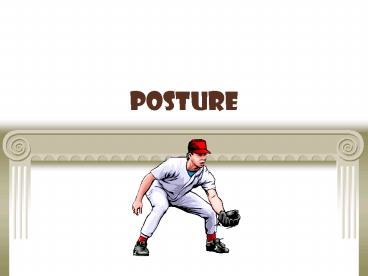Posture - PowerPoint PPT Presentation
1 / 22
Title:
Posture
Description:
Balance is achieved when the centre of gravity is vertically aligned ... Full flexion of the knees. May affect circulation. Said to aid emptying of the bowels ... – PowerPoint PPT presentation
Number of Views:1199
Avg rating:3.0/5.0
Title: Posture
1
Posture
2
Biomechanics
- our muscles and bones operate as a series of
lever systems, that is they include an
operational force supplied by the muscle, a
fulcrum which is the joint between bones and a
force to be overcome the work to be performed.
3
Biomechanics
d
dr
F
Fr
1st class lever to enable balance (no
movement) F ? d Fr ? dr
4
Balance
- Balance is achieved when the centre of gravity
is vertically aligned with the base of support.
Stability is dependent upon the size of the base
of support and the height of the centre of
gravity.
5
Standing
- Highly efficient
- Balance is dynamic rather than static
- Energy expenditure is low
6
Spinal curves
- One C shaped curve at birth
- Two reverse curves in cervical and lumbar regions
- Curves return to C with age
7
Lying
- Lying prone results in marked lordosis
- Lying supine, curves will depend on support
- Disc pressure much higher when lying sideways
8
Sitting
- Support the weight of the trunk
- Relax muscles
- Maintain lordosis
- Reduce intra-discal pressure
9
Squatting
- Full flexion of the knees
- May affect circulation
- Said to aid emptying of the bowels
10
Squatting
Squatting - said to aid in the emptying of the
bowels
11
Working posture
- In general, a varied working posture is better
than a fixed working posture, but a working
posture that is static and relaxed is better than
one which is static and tense.
12
Awkward postures movements
- Bending the back forwards or sideways more than
20 degrees - Twisting the back more than 20 degrees
- Backward bending of the back more than 5 degrees
- Bending the head forwards or sideways more than
20 degrees - Twisting the neck more than 20 degrees
- Bending the head backwards more than 5 degrees
13
Awkward postures movements
- Working with one or both hands above shoulder
height - Reaching forwards or sideways more than 30 cm
from the body - Reaching behind the body
- Squatting, kneeling, crawling, lying, semi-lying
or jumping - Standing with most of the bodys weight on one leg
14
Awkward postures movements
- Twisting, turning, grabbing, picking or wringing
actions with the fingers, hands or arms - Working with the fingers close together or wide
apart - Very fast movements
- Excessive bending of the wrist
15
Excessive bending of the wrist
15 degrees
15 degrees
Where the fingers and hands are not applying high
forces And the fingers are fairly straight (e.g.
typing)
16
Excessive bending of the wrist
35 degrees
15 degrees
Where the fingers are bent or applying higher
forces (e.g. gripping)
17
Excessive bending of the wrist
15 degrees
20 degrees
Where the wrist is bent to the side
18
Case study 1
Is this a good posture? How could you tell?
19
Case Study 2
20
Case Study 3
Surveying in Tank Farms requires many awkward
postures
Us Dept. of Energy, Hanford
21
Case Study 4
22
Case Study 5
He used to be a motor mechanic































